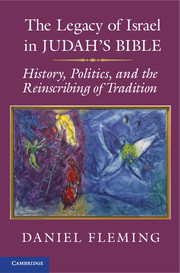Book contents
- Frontmatter
- Contents
- Preface
- Acknowledgments
- List of Abbreviations
- Part I Introduction
- Part II Israelite Content in the Bible
- 3 Writing from Judah
- 4 An Association of Peoples in the Land (The Book of Judges)
- 5 The Family of Jacob
- 6 Collective Israel and Its Kings
- 7 Moses and the Conquest of Eastern Israel
- 8 Joshua and Ai
- 9 Benjamin
- 10 Israelite Writers on Early Israel
- Part III Collaborative Politics
- Part IV Israel in History
- Bibliography
- Index of Biblical Texts
- Index of Near Eastern Texts
- Subject Index
3 - Writing from Judah
Published online by Cambridge University Press: 05 August 2012
- Frontmatter
- Contents
- Preface
- Acknowledgments
- List of Abbreviations
- Part I Introduction
- Part II Israelite Content in the Bible
- 3 Writing from Judah
- 4 An Association of Peoples in the Land (The Book of Judges)
- 5 The Family of Jacob
- 6 Collective Israel and Its Kings
- 7 Moses and the Conquest of Eastern Israel
- 8 Joshua and Ai
- 9 Benjamin
- 10 Israelite Writers on Early Israel
- Part III Collaborative Politics
- Part IV Israel in History
- Bibliography
- Index of Biblical Texts
- Index of Near Eastern Texts
- Subject Index
Summary
It is common in modern technical parlance to divide biblical writing by the exile, the devastating blow that brought an end to the institutions of Jerusalem status and authority: the ruling house of David and the temple of Yahweh. Relatively early texts are “preexilic,” often revised for “postexilic” needs, with the relative balance between these categories a matter of debate. Although there is increasing attention paid to the activity of scribes from the kingdom of Israel and its survivors, references to preexilic writing often have in mind Judah of the seventh century, during the reigns of Hezekiah, Manasseh, and Josiah. Indeed, these were the glory days of the kingdom of Judah, as reflected in the massive growth of Jerusalem during the eighth century (e.g., Na'aman 2007b), and the situation in this period may have influenced greatly both the production of texts and their political assumptions. At this point, it is clear that the kingdom was called Judah, and our biblical portrait of Judah's monarchic politics appears to derive mainly from this later stage of the monarchy.
According to 2 Samuel 5, Jerusalem first became a capital city for the royal house of David with David himself, when he made it the base from which he ruled Israel. After having established this political center, David is said to have brought the ark of God to Jerusalem, thus combining political with sacred status (2 Samuel 6). Solomon is then envisioned to have consolidated this powerful pairing by constructing a monumental-scale palace and temple (1 Kings 6–7). Nothing in the remaining text of Kings hints that this combination of authorities entered Jerusalem at a later date, such as with the city's success in the eighth century, when the kingdom became a large-scale polity that some would call a “state.” We must therefore beware of attributing this centralization only to Judah's growth. We will return to the question of the early kingdom and Jerusalem; our biblical evidence is concentrated in texts occupied with David, Solomon, and Rehoboam's establishment of a new kingdom in 1 Kings 12. Recognizing this limitation, my objective here is to give a sense of Judahite political perspectives as displayed in a range of texts both during and after the monarchy.
- Type
- Chapter
- Information
- The Legacy of Israel in Judah's BibleHistory, Politics, and the Reinscribing of Tradition, pp. 39 - 57Publisher: Cambridge University PressPrint publication year: 2012



